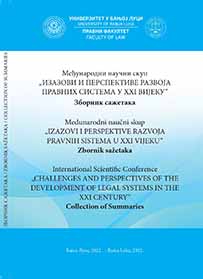THE HISTORICAL DEVELOPMENT OF WOMEN’S INHERITANCE RIGHTS
THE HISTORICAL DEVELOPMENT OF WOMEN’S INHERITANCE RIGHTS
Author(s): Đorđe Raković, Mirjana MiškićSubject(s): Gender Studies, Law, Constitution, Jurisprudence, History of Law, Civil Law, Human Rights and Humanitarian Law, Roman law
Published by: Правни факултет Универзитета у Бањој Луци
Keywords: Inheritance Law; Family; Property; Alieni iuris; Pater familias;
Summary/Abstract: The development of female inheritance rights was marked by patriarchal conditioning. In most of the ancient legal systems, women could become heirs if they were legally married to their husband (testator) or if they were daughters without a male relative (brother). According to the Code of the Twelve Tables, a woman could inherit only if she were married into manus and a daughter, if she were person alieni iuris, under paternal power. Thus, the daughter, going to the groom’s house, would lose her inheritance rights towards her family. These provisions were not considered discriminatory in the context of the times. The Code treated the son who would leave the family authority equally. However, the heir son as a potential pater familias had become a more desirable successor over time. The author will try to show that family affection towards the male heir deeply conditioned the development of inheritance rights and the formation of the attitude that women have no right to family property. Unfortunately, even though the current regulations have long been non-discriminatory towards women, the established understanding still affects women or daughters renouncing their inheritance rights in favor of a male relative.
Journal: Зборник радова Међународни научни скуп „Изазови и перспективе развоја правних система у XXI вијеку"
- Issue Year: 2022
- Issue No: 2
- Page Range: 459-470
- Page Count: 12
- Language: English

